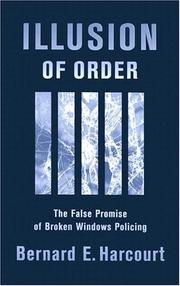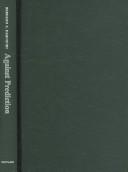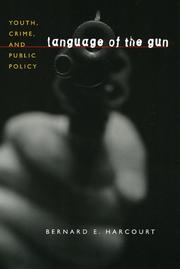| Listing 1 - 10 of 30 | << page >> |
Sort by
|
Book
ISBN: 9780674057265 0674057260 0674066162 0674059360 9780674066168 9780674059368 0674971329 Year: 2011 Publisher: Cambridge: Harvard university press,
Abstract | Keywords | Export | Availability | Bookmark
 Loading...
Loading...Choose an application
- Reference Manager
- EndNote
- RefWorks (Direct export to RefWorks)
It is widely believed today that the free market is the best mechanism ever invented to efficiently allocate resources in society. Just as fundamental as faith in the free market is the belief that government has a legitimate and competent role in policing and the punishment arena. This curious incendiary combination of free market efficiency and the Big Brother state has become seemingly obvious, but it hinges on the illusion of a supposedly natural order in the economic realm. This work argues that our faith in "free markets" has severely distorted American politics and punishment practices. The author traces the birth of the idea of natural order to eighteenth century economic thought and reveals its gradual evolution through the Chicago School of economics and ultimately into today's myth of the free market. The modern category of "liberty" emerged in reaction to an earlier, integrated vision of punishment and public economy, known in the eighteenth century as "police." This development shaped the dominant belief today that competitive markets are inherently efficient and should be sharply demarcated from a government run penal sphere. ThIs modern vision rests on a simple but devastating illusion. Superimposing the political categories of "freedom" or "discipline" on forms of market organization has the unfortunate effect of obscuring rather than enlightening. It obscures by making both the free market and the prison system seem natural and necessary. In the process, it facilitated the birth of the penitentiary system in the nineteenth century and its ultimate culmination into mass incarceration today.
Economic order --- United States --- Punishment --- Free enterprise --- Chicago school of economics --- Chicago Board of Trade --- Chicago school of economics. --- Chicago Board of Trade. --- economie de marche libre --- AA / International- internationaal --- US / United States of America - USA - Verenigde Staten - Etats Unis --- FR / France - Frankrijk --- 330.1 --- 330.52 --- 351.5 --- 321.2 --- vrije markteconomie --- Domein en natuur van de staathuishoudkunde. --- Liberaal systeem. Neo-liberalisme. Theorie van de onderhandeling. --- Politie van de industrie, de handel en het vervoer. --- Economisch beleid van de overheid. --- E-books --- Monetarism --- Institutional economics --- Neoclassical school of economics --- Schools of economics --- Chicago. --- Board of Trade of the City of Chicago --- Board of Trade of Chicago --- CBOT --- CME Group --- Economisch beleid van de overheid --- Domein en natuur van de staathuishoudkunde --- Liberaal systeem. Neo-liberalisme. Theorie van de onderhandeling --- Politie van de industrie, de handel en het vervoer --- Punishment - United States --- Free enterprise - United States --- United States of America

ISBN: 9780674015906 0674015908 Year: 2004 Publisher: Cambridge: Harvard university press,
Abstract | Keywords | Export | Availability | Bookmark
 Loading...
Loading...Choose an application
- Reference Manager
- EndNote
- RefWorks (Direct export to RefWorks)

ISBN: 0226316130 0226316149 9780226316130 9780226316147 9780226315997 0226315991 1281957070 9781281957078 9786611957070 6611957073 Year: 2007 Publisher: Chicago: University of Chicago press,
Abstract | Keywords | Export | Availability | Bookmark
 Loading...
Loading...Choose an application
- Reference Manager
- EndNote
- RefWorks (Direct export to RefWorks)
From routine security checks at airports to the use of risk assessment in sentencing, actuarial methods are being used more than ever to determine whom law enforcement officials target and punish. And with the exception of racial profiling on our highways and streets, most people favor these methods because they believe they’re a more cost-effective way to fight crime. In « Against Prediction », Bernard E. Harcourt challenges this growing reliance on actuarial methods. These prediction tools, he demonstrates, may in fact increase the overall amount of crime in society, depending on the relative responsiveness of the profiled populations to heightened security. They may also aggravate the difficulties that minorities already have obtaining work, education, and a better quality of life—thus perpetuating the pattern of criminal behavior. Ultimately, Harcourt shows how the perceived success of actuarial methods has begun to distort our very conception of just punishment and to obscure alternate visions of social order. In place of the actuarial, he proposes instead a turn to randomization in punishment and policing. The presumption, Harcourt concludes, should be against prediction
Criminal behavior, Prediction of --- Law enforcement --- Racial profiling in law enforcement --- Statistical methods --- Statistical methods. --- Racial profiling in law enforcement - United States --- Criminal behavior, Prediction of - United States --- Law enforcement - United States - Statistical methods
Book
ISBN: 9780674504578 0674504577 0674915070 0674915097 Year: 2015 Publisher: Cambridge, Mass.: Harvard university press,
Abstract | Keywords | Export | Availability | Bookmark
 Loading...
Loading...Choose an application
- Reference Manager
- EndNote
- RefWorks (Direct export to RefWorks)
Exploiting our boundless desire to access everything all the time, digital technology is breaking down whatever boundaries still exist between the state, the market, and the private realm. Bernard Harcourt offers a powerful critique of what he calls the expository society, revealing just how unfree we are becoming and how little we seem to care.
Human rights --- Computer. Automation --- cultuurfilosofie --- mediatheorie --- mediakunde --- bewaking --- satelliettechnologie --- surveillance --- Big Brother --- activisme --- sociale media --- informatiewetenschap --- informatiedesign --- 130.2 --- filosofie --- sociologie --- politiek --- media --- Information technology --- Privacy, Right of. --- Technologie de l'information --- Droit à la vie privée --- Social aspects. --- Aspect social --- Privacy, Right of --- Social aspects --- Information technology - Social aspects
Book
ISBN: 9780231195720 Year: 2020 Publisher: New-York : Columbia University Press,
Abstract | Keywords | Export | Availability | Bookmark
 Loading...
Loading...Choose an application
- Reference Manager
- EndNote
- RefWorks (Direct export to RefWorks)
Critical philosophy has always questioned the division between theory and practice. At its best, it aims to turn contemplation into emancipation, seeking to transform society in pursuit of the flourishing of humanity. Yet today's critical theorists often seem to engage only in critique. These times of crises demand more. No philosophical school is better equipped to deal with the challenges of the present. But how can we rethink critique in order to redirect it outward toward changing the world?In Critique and Praxis, Bernard E. Harcourt challenges us to move beyond the complacency of decades of philosophical detours and to harness critical thought to the need for action. In a time of increasing awareness of economic and social inequality, of the privileges of some and the deprivations of the many, Harcourt calls on us to make society more equal and just. Only critical theory can guide us toward a more concerted and self-reflexive pursuit of justice. Charting a vision for political action and social transformation, Harcourt argues that instead of answering the question, "What is to be done?" we must now turn it back onto ourselves and ask, "What more am I to do?"Critique and Praxis advocates for a new path forward that constantly challenges each and every one of us to ask what more we can do to realize a society based on equality and justice. Joining his decades of activism, social-justice litigation, and political engagement with his career of critical theory and philosophical work, Harcourt has written a magnum opus.
Book
ISBN: 0674915097 0674915070 9780674915077 9780674504578 0674504577 Year: 2015 Publisher: Cambridge, MA
Abstract | Keywords | Export | Availability | Bookmark
 Loading...
Loading...Choose an application
- Reference Manager
- EndNote
- RefWorks (Direct export to RefWorks)
Exploiting our boundless desire to access everything all the time, digital technology is breaking down whatever boundaries still exist between the state, the market, and the private realm. Bernard Harcourt offers a powerful critique of what he calls the expository society, revealing just how unfree we are becoming and how little we seem to care.
Information technology --- Privacy, Right of. --- Invasion of privacy --- Privacy, Right of --- Right of privacy --- Civil rights --- Libel and slander --- Personality (Law) --- Press law --- Computer crimes --- Confidential communications --- Data protection --- Right to be forgotten --- Secrecy --- Social aspects. --- Law and legislation

ISBN: 0226316084 0226316092 Year: 2006 Publisher: Chicago (Ill.) : University of Chicago press,
Abstract | Keywords | Export | Availability | Bookmark
 Loading...
Loading...Choose an application
- Reference Manager
- EndNote
- RefWorks (Direct export to RefWorks)
Legal and public policies concerning youth gun violence tend to rely heavily on crime reports, survey data, and statistical methods. Rarely is attention given to the young voices belonging to those who carry high-powered semiautomatic handguns. In 'Language of the Gun, 'Bernard E. Harcourt recounts in-depth interviews with youths detained at an all-malecorrectional facility, exploring how they talk about guns and what meanings they ascribe to them in a broader attempt to understand some of the assumptions implicit in current handgun policies. In the process, Harcourt redraws the relationships among empirical research, law, and public policy. Home to over 150 repeat offenders ranging in age from twelve to seventeen, the Catalina Mountain School is made up of a particular stratum of boys& those who have committed the most offenses but will still be released upon reaching adulthood. In an effort to understand the symbolic and emotional language of guns and gun carrying, Harcourt interviewed dozens of these incarcerated Catalina boys. What do these youths see in guns? What draws them to handguns? Why do some of them carry and others not? For Harcourt, their often surprising answers unveil many of the presuppositions that influence our laws and policies.
Firearms and crime. --- Firearms ownership --- Firearms --- Gun control --- Juvenile delinquents --- Social sciences --- Youth and violence. --- Social aspects. --- Attitudes. --- Philosophy. --- Catalina Mountain School.
Book
ISBN: 9781541697287 9781541697270 Year: 2018 Publisher: New York, N.Y. Basic Books
Abstract | Keywords | Export | Availability | Bookmark
 Loading...
Loading...Choose an application
- Reference Manager
- EndNote
- RefWorks (Direct export to RefWorks)
Book
ISBN: 0231195737 9780231195737 Year: 2022 Publisher: New York : ©2020 Columbia University Press,
Abstract | Keywords | Export | Availability | Bookmark
 Loading...
Loading...Choose an application
- Reference Manager
- EndNote
- RefWorks (Direct export to RefWorks)
Critical philosophy has always questioned the division between theory and practice. At its best, it aims to turn contemplation into emancipation, seeking to transform society in pursuit of the flourishing of humanity. Yet today's critical theorists often seem to engage only in critique. These times of crises demand more. No philosophical school is better equipped to deal with the challenges of the present. But how can we rethink critique in order to redirect it outward toward changing the world? In Critique and Praxis, Bernard E. Harcourt challenges us to move beyond the complacency of decades of philosophical detours and to harness critical thought to the need for action. In a time of increasing awareness of economic and social inequality, of the privileges of some and the deprivations of the many, Harcourt calls on us to make society more equal and just. Only critical theory can guide us toward a more concerted and self-reflexive pursuit of justice. Charting a vision for political action and social transformation, Harcourt argues that instead of answering the question, "What is to be done?" we must now turn it back onto ourselves and ask, "What more am I to do?" Critique and Praxis advocates for a new path forward that constantly challenges each and every one of us to ask what more we can do to realize a society based on equality and justice. Joining his decades of activism, social-justice litigation, and political engagement with his career of critical theory and philosophical work, Harcourt has written a magnum opus.
Critical theory. --- Political science --- Political participation. --- Social action. --- Philosophy.
Book
ISBN: 0231551452 0231195729 Year: 2020 Publisher: New York, New York State : Columbia University Press,
Abstract | Keywords | Export | Availability | Bookmark
 Loading...
Loading...Choose an application
- Reference Manager
- EndNote
- RefWorks (Direct export to RefWorks)
Critical philosophy has always challenged the division between theory and practice. At its best, it aims to turn contemplation into emancipation, seeking to transform society in pursuit of equality, autonomy, and human flourishing. Yet today’s critical theory often seems to engage only in critique. These times of crisis demand more.Bernard E. Harcourt challenges us to move beyond decades of philosophical detours and to harness critical thought to the need for action. In a time of increasing awareness of economic and social inequality, Harcourt calls on us to make society more equal and just. Only critical theory can guide us toward a more self-reflexive pursuit of justice. Charting a vision for political action and social transformation, Harcourt argues that instead of posing the question, “What is to be done?” we must now turn it back onto ourselves and ask, and answer, “What more am I to do?”Critique and Praxis advocates for a new path forward that constantly challenges each and every one of us to ask what more we can do to realize a society based on equality and justice. Joining his decades of activism, social-justice litigation, and political engagement with his years of critical theory and philosophical work, Harcourt has written a magnum opus.
Critical theory. --- Political science --- Political participation. --- Social action. --- Philosophy.
| Listing 1 - 10 of 30 | << page >> |
Sort by
|

 Search
Search Feedback
Feedback About UniCat
About UniCat  Help
Help News
News